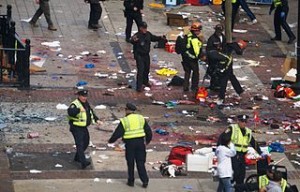
The aftermath of the explosions (Russavia/Wikimedia Commons)
With the rapid speed of today’s media content production, journalists do not have hours to formulate theories or approaches to breaking news stories, especially not deadly emergencies like Monday’s Boston Marathon explosions. Tanveer Ali, in a post for the Columbia Journalism Review, urges journalists to use caution when thinking about attaching the word “terrorism” to the attack that killed three and reportedly injured more than 100.
“The media has no role, since it has no expertise, in determining whether an act is one of terrorism or not,” said Bruce Hoffman, a terrorism scholar at Georgetown University, in an email to Ali. “One thing is that they should resist pressing the authorities, pundits, and those who have specialized in studying terrorism for many decades to speculate on who may have done it and why.”
The White House did not label the attack an act of terrorism, though they said the FBI is investigating it as such. On Monday, CNN made an editorial decision to call the Boston event a terrorist attack, and in Europe papers like The Guardian called it a terror attack almost immediately.
Though the FBI even admits the definition of terrorism is hard to pin down, the term does represent a certain weight to Americans with a post-9/11 attitude about explosions. In a democracy where the media ultimately establishes terminology, Ali says it’s best for journalists to avoid the word “terrorism” until clearer notions of what happened prevail.








